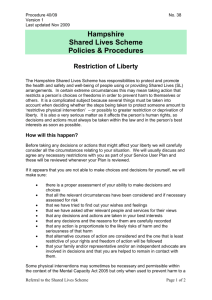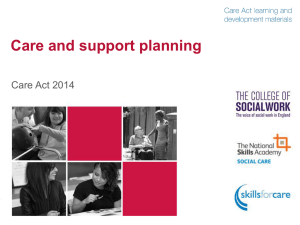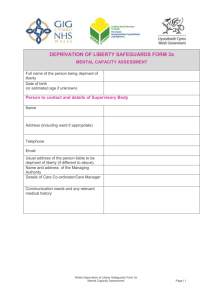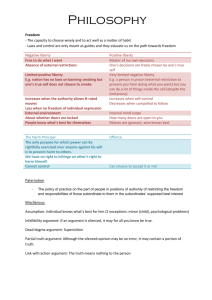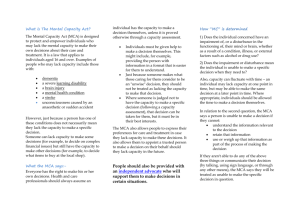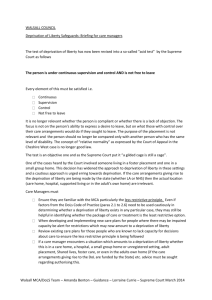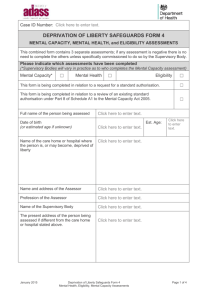Restriction or deprivation of liberty
advertisement
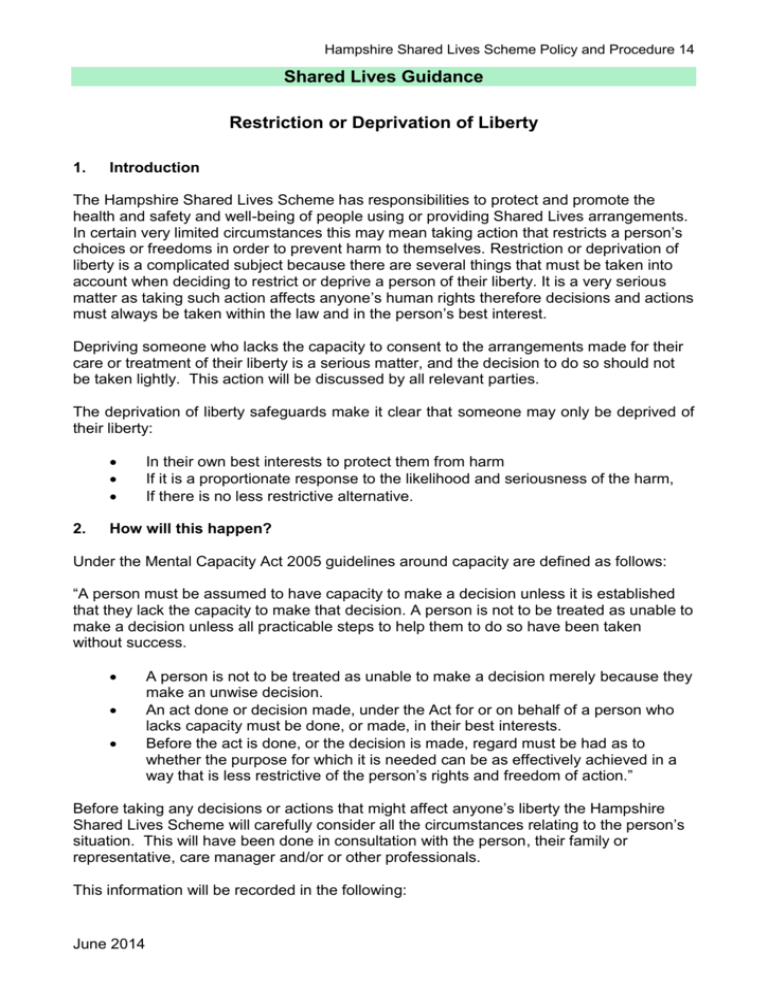
Hampshire Shared Lives Scheme Policy and Procedure 14 Shared Lives Guidance Restriction or Deprivation of Liberty 1. Introduction The Hampshire Shared Lives Scheme has responsibilities to protect and promote the health and safety and well-being of people using or providing Shared Lives arrangements. In certain very limited circumstances this may mean taking action that restricts a person’s choices or freedoms in order to prevent harm to themselves. Restriction or deprivation of liberty is a complicated subject because there are several things that must be taken into account when deciding to restrict or deprive a person of their liberty. It is a very serious matter as taking such action affects anyone’s human rights therefore decisions and actions must always be taken within the law and in the person’s best interest. Depriving someone who lacks the capacity to consent to the arrangements made for their care or treatment of their liberty is a serious matter, and the decision to do so should not be taken lightly. This action will be discussed by all relevant parties. The deprivation of liberty safeguards make it clear that someone may only be deprived of their liberty: 2. In their own best interests to protect them from harm If it is a proportionate response to the likelihood and seriousness of the harm, If there is no less restrictive alternative. How will this happen? Under the Mental Capacity Act 2005 guidelines around capacity are defined as follows: “A person must be assumed to have capacity to make a decision unless it is established that they lack the capacity to make that decision. A person is not to be treated as unable to make a decision unless all practicable steps to help them to do so have been taken without success. A person is not to be treated as unable to make a decision merely because they make an unwise decision. An act done or decision made, under the Act for or on behalf of a person who lacks capacity must be done, or made, in their best interests. Before the act is done, or the decision is made, regard must be had as to whether the purpose for which it is needed can be as effectively achieved in a way that is less restrictive of the person’s rights and freedom of action.” Before taking any decisions or actions that might affect anyone’s liberty the Hampshire Shared Lives Scheme will carefully consider all the circumstances relating to the person’s situation. This will have been done in consultation with the person, their family or representative, care manager and/or or other professionals. This information will be recorded in the following: June 2014 Hampshire Shared Lives Scheme Policy and Procedure 14 Service User Plan Risk assessments and management plans Shared Lives Placement Agreement All the above will be reviewed on a regular basis or as required. If it appears that the person is not able to make choices and decisions for themself, the Hampshire Shared Lives Scheme and Shared Lives Carers will make sure that: A professional assessment of the person’s ability and capacity to make decisions and choices has been completed All the relevant circumstances have been considered Attempt(s) have been made to find out the person’s wishes and feelings Other relevant people have been asked for their views Any decisions and actions are taken in the person’s best interests Any decisions and the reasons for them are carefully recorded Any action is proportionate to the likely risks of harm and the seriousness of that harm Alternative courses of action have been considered and the one that is least restrictive of the person’s rights and freedom of action will be followed The person’s family and/or representative have, if appropriate, been involved in the decisions and the person has been assisted in maintaining communication with their family If the person does not have any relatives or anyone with responsibility to assist them then an Independent Mental Capacity Advocate can be provided In some situations Physical Interventions may be necessary and is permissible within the context of the Mental Capacity Act 2005/Adults with Incapacity Scotland (2000) Physical Intervention is only used as a last resort and where situations have presented where a person is at serious risk of harm to themselves and others. This must be discussed with all relevant parties. In a land mark case in Manchester it was made clear that any removal of a service user from their Shared Lives family or subsequent placement without consent may represent a breach of the Human Rights Act and the Mental Capacity Act 2005 Deprivation Of Liberties Safeguards. It is important to recognise the demands on a Shared Lives Carer who is supporting someone who has been assessed as lacking capacity. Shared Lives schemes are responsible for providing information and training that enables the Shared Lives Carer to understand their role in order to support the person appropriately. June 2014
